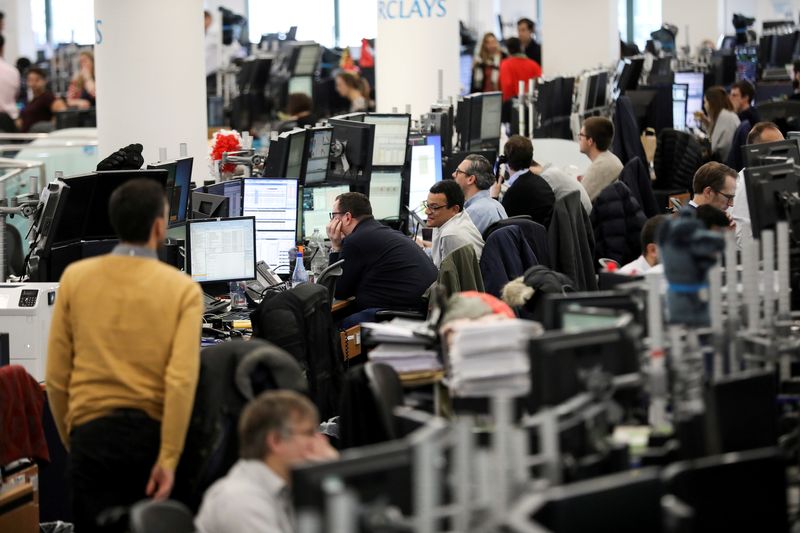Pandemic recovery fuels deal craze as third-quarter M&A breaks all records By Reuters
[ad_1]
 © Reuters. FILE PHOTO – Traders are seen working on the Canary Wharf trading floor at Barclays Bank in London. December 7, 2018. REUTERS/Simon Dawson/File Photo
© Reuters. FILE PHOTO – Traders are seen working on the Canary Wharf trading floor at Barclays Bank in London. December 7, 2018. REUTERS/Simon Dawson/File PhotoBy Pamela Barbaglia and Anirban Sen
LONDON (Reuters) – Global mergers and acquisitions hit new record highs in the third quarter as companies and investors shaped their post-COVID future through transformative deals while their advisers struggled to cope with transaction volumes never seen before.
The three months ended Sept. 27 saw a record-breaking summer of merger activity that produced $1.52 trillion, up 38% over last year’s quarter and more than any quarter in recorded history according to Refinitiv data.
Third-quarter volumes drove global M&A activity in the first nine months of 2021 to an unprecedented record of $4.33 trillion, overtaking an all-time annual peak of $4.1 trillion hit before the financial crisis in 2007 and forcing investment banks to hike pay for overworked and disgruntled junior staff.
“The path to recovery is increasingly clear and people are looking beyond COVID,” said Birger Berendes who co-heads M&A in EMEA at Bank of America (NYSE:).
Investors want businesses to seek acquisitions that will help them grow, add capability or improve their services and not just pay dividends.
Third-quarter volumes doubled in Europe with $473 billion worth of M&A deals compared with the same quarter last year while the United States was up 32% to $581 billion and Asia Pacific rose 21% to $365 billion.
“M&A is a confidence game. Both corporates and sponsors feel very good about the current environment and that’s why they are aggressively pursuing opportunities before there is a market correction,” said Dirk Albersmeier, global co-head of M&A at JPMorgan (NYSE:).
He added that “investors are sensitive about factors such as inflation and interest rate developments, increased regulatory scrutiny”
While U.S. President Joe Biden’s upcoming tax reforms are likely to increase the cost of doing deals, top M&A bankers said they do not expect a slowdown in deal-making in the near term.
“The new tax policies are not even an issue. Not impacting deals, whatsoever – probably a reflection on how people feel about the likelihood that it’s going to come into fruition next year,” said Mark Bekheit, an M&A partner at law firm Latham & Watkins LLP.
The quarterly chart was topped by a $32.6 million SPAC deal between Lionheart Acquisition Corp II and U.S. company MSP Recovery.
Other sizable deals include Square’s $29 billion takeover of Afterpay, Vivendi (OTC:)’s spinoff of Universal Music Group (AS:) and an 18.4 billion-pound swoop by U.S. sports betting firm DraftKings (NASDAQ:) on Ladbrokes (LON:) owner Entain.
ANIMAL SPIRITS
Progress made by Western economies to vaccinate their adult population and the easing of COVID restrictions during the summer fuelled animal spirits with bidding wars erupting among private equity firms for control of listed companies including British supermarket group Morrisons.
As investment companies rushed to cash out, they often paid high prices for assets on the public market. Private equity buyouts soared to an unprecedented 133% increase to $818 billion during the first nine months.
Private equity firms, according to banks, have learned how to manage risk following the financial crisis.
It is clear that the valuations of companies are extremely high right now. “Funds seek out opportunities that they believe can add value,” Anna Skoglund (NYSE:), head of Goldman Sachs’ EMEA financial and strategic investors group.
“We’ve moved beyond opportunistic and more financially driven transactions towards thematic investment and platform building.
As the Federal Reserve’s Bond-Buying programme helped drive interest rates down to an all-time low, it is likely that this shopping frenzy will continue. It has offered cheap debt financing to potential buyers and has helped to keep them in check.
“The rationale is pretty straightforward – we’re really awash in liquidity,” said Mark Shafir, global co-head of M&A at Citigroup (NYSE:).
“You have an extremely hospitable fixed income market, both in terms rates and availability. There’s lots of potential for deals.
CARPE DIEM
Deal-making surged in most sectors of the economy, especially the technology industry – where software deals more than tripled in the first nine months of the year – as well as energy and power with companies accelerating their move into renewables projects as part of their transition to a net-zero future.
Corporate buyers are now more agile to capitalize on opportunities, and can compete better with private equity through fast-paced auctions. Dealmakers claim that corporate buyers still carefully consider risk.
“Boards will continue to evaluate multiple options in order to achieve their strategic objectives. Clients are being very thoughtful about using M&A to accelerate their strategy where they see the opportunity to do so,” said Omar Faruqui, co-head of EMEA M&A at Barclays (LON:).
As the threat of activist shareholders resurfaces, bankers say the pipeline ahead will also include spinoffs to unlock value trapped in profitable units and take advantage of buoyant stock markets.
The key to driving positive change is activist funds, which are closely monitoring how businesses navigate the changes required for adapting their business models to the post COVID environment.
“Market disruptions result in a drop in activism. Not surprisingly, when the pandemic hit you saw a real pullback,” said Morgan Stanley (NYSE:)’s David Rosewater, a managing director of the activist defense group.
You saw activism return and be rewarded for additional opportunities as the market recovered.”
[ad_2]

